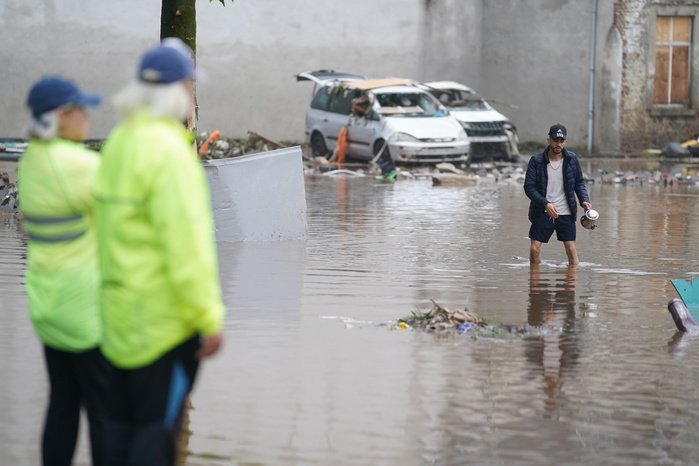Heavy rainfall which resulted in flooding has wreaked havoc across many parts of Belgium, and as the weather has calmed down, the damage it has left behind has become even more clear.
In total, the death toll as a result of the severe weather has reached at least 14 in Belgium, including a 22-year-old man, whilst searches are ongoing for at least four missing people, including a 15-year-old girl who was swept away by the river Ourthe.
Although the weather has calmed down in most parts of the country, the flooding has had a severe impact on the river Maas' water levels, as it continued to rise steadily overnight, and has now reached a particularly critical point, leading to the evacuation of several municipalities in Limburg.
Related News
- Severe rainfall: 9:00 PM curfew in Verviers, three missing as rescue boat overturns
- Severe rainfall: Belgium's death toll rises to six
- Severe rainfall: Two dead as Belgium calls for help from neighbouring countries
Especially in Maaseik, the situation remains precarious, which led to a crisis meeting being held in the region this morning. In Lanaken, on the Dutch border, the Maas rose up to 30 centimetres lower than the historical high point.
How this situation develops depends on the Monsin dam just above Liège, as this dam failing will result in a mass of water streaming towards Limburg. Only two of the six sluice gates are working.
La #Meuse a 16h a côté de la boverie. Elle a monté encore 20cm depuis. Chercher refuge en hauteur! #liege #alerterouge #flooding pic.twitter.com/sgMeEjTFng
— Sara Echeverry ?? ???️? (@saraecheverry) July 15, 2021
"If that dam should fail, we would experience a disaster. As long as all the problems in Liege are not resolved, we don't know whether that lock will hold. We will probably only know tomorrow morning whether we have made it," Governor of Limburg Jos Lantmeeters told VRT News.
In Wallonia, where the situation started out worst on Wednesday and Thursday, hundreds of people were also evacuated in several municipalities, and in Liège, the mayor even called on people to leave the city if possible.
As a result of the heaving flooding, more than 21,000 people have also been left without electricity in Wallonia, with people living in Durbuy, Rochefort, Spa, Theux and Verviers most affected, according to the Walloon distribution network manager, Ores.
On Thursday afternoon, reports of water becoming undrinkable in the most affected regions in Wallonia began to surface, and the Société Wallonne des Eaux (SWDE), the region’s main company for the production and distribution of drinking water, later issued a warning that, in some places, tap water should not be used for food purposes, even if boiled.
Flemish Prime Minister Jan Jambon said on Friday that he was convinced Thursday's storm will be recognised as a disaster by the Flemish government, in which case the disaster fund will cover damage to objects that are not covered by fire or car insurance.
Meanwhile, in neighbouring Germany, the severe weather caused even more damage and took more lives. As of Friday morning, the death toll is at least 80, whilst in one municipality alone, around 1,300 people are missing, according to German news outlet Bild.

